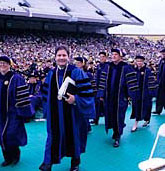McCormick has also changed the way the UW serves its students. "One of our efforts is to ensure that undergraduates get the courses they need when they need them," he says.
It's no surprise to alumni that students can't always get into every course they want to take. But when that course is a prerequisite to a major, it can create a bottleneck and delay graduation. The University has spent millions on computer systems to track the bottlenecks and on new course sections to open the pipelines.
"Of some 50 courses that were identified as problem areas, we've improved student access significantly in about half of them and we've made more modest improvement in another one-quarter. So we've achieved some progress, but we have not yet reached the point where we can say that all undergraduates can get the courses they want when they want them," McCormick notes.
The investment is having an effect on the overall graduation rate. When McCormick arrived at the UW, 67 percent of its undergraduates received their degrees within six years. Today the UW six-year graduation rate is 72 percent. "Contrary to popular impression, graduation rates are improving, not worsening," he says. "It reflects the changes in the way we're managing the University internally, so I'm very proud of that."
There are other happy numbers. Last year the UW received a record amount in research grant and contract income, about $600 million, and it continues to be the top public university in the nation in the amount of federal research income it earns. Private giving is also at record levels, with $103 million in private gifts last year, a 21 percent increase over the previous year.

In his academic regalia, President McCormick marches with the regents toward a temporary stage in Husky Stadium for the UW's commencement ceremonies. Photo by Mary Levin.
The President also talks about people when he reviews his impact on the University of a Thousand Years. "One of my responsibilities and privileges as president is to appoint deans, vice presidents and other leading members of the administration.
"I did not anticipate how important that would become. But this is possibly my greatest opportunity for having a long-term impact on the University, through the people I appoint, more than anything I do myself."
He recounts a long list of appointments—Lee Huntsman as provost; Denice Denton, the first woman to head a top engineering school in the nation; Paul Ramsey, the dean of the medical school who stepped in after the tragic death of Philip Fialkow during a trek in Nepal; Yash Gupta, recently appointed dean of the business school; Marc Lindenberg, the dean of the Evans School of Public Affairs; David Hodge, dean of arts and sciences; Marsha Landolt, dean of the graduate school; and others.
"These are deans and vice presidents who are agents of change and who are empowered to transform their colleges and schools. I take a lot of pride in these appointments," he says.
But change is coming from beyond the University as well as from within. When President McCormick arrived in 1995, the UW had just launched its Web site. Five years later, the Internet has transformed everyday life, from the way we get the latest weather and sports scores to how we buy gifts or order groceries.
Higher education is also facing a revolution in "e-instruction." Some public as well as private universities are offering Internet-based degrees across the nation. Legislators look to computer terminals and high speed connections as a better investment than bricks and mortar—or new professors. In 1998, concerned that Olympia might resort to computers as a quick fix for access to higher education, more than 900 UW faculty signed a letter condemning any move to a "virtual university."
But McCormick is optimistic about the coming changes. "For a long, long time to come—even as more students take more courses via distance learning and we have more offerings via distance learning—the UW campus will still be a physical place that adds value. People will want to come here because there are faculty, staff, classrooms, libraries, laboratories, football, a pretty campus, residence halls—and above all, other students," he says.
"It's a new world where we'll be stretched by competition from other universities. That competition will be good for students because it will improve their opportunities. The changes will also be good for the institution because, overall, they will make us better through the competitive process. There'll be some pain and bumps along the way, but it's a healthy new world."
"It's satisfying to provide leadership for change at the University of Washington," he says. "The opportunities are boundless."
Tom Griffin is editor of Columns.
- Return to June 2000 Table of Contents
